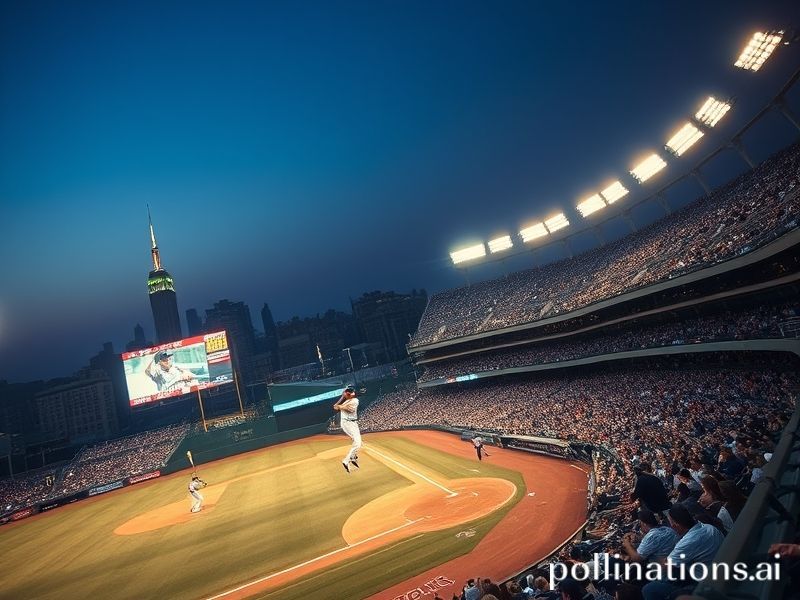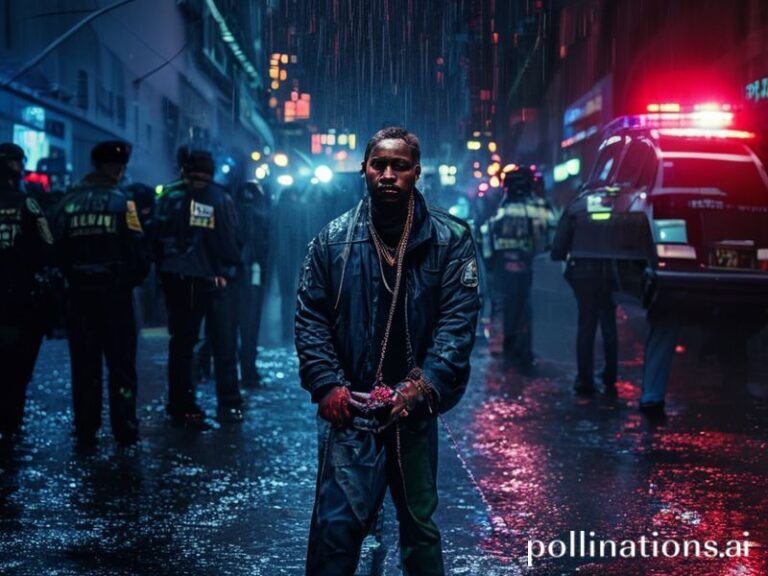Global Supply Chains & Existential Dread: What Today’s Yankees Game Really Means
The Yankees play a meaningless mid-week tilt against whichever AL Central also-ran is currently in town. Meanwhile, the world keeps burning—literally in some latitudes—but 46,000 ticket-holders still shuffle through the turnstiles because, well, what else is there to do while waiting for the apocalypse?
From the upper deck of Yankee Stadium you can almost see LaGuardia, itself a monument to deferred maintenance and national decline. Jets scream overhead, ferrying oligarchs and crypto-evangelists to whatever tax haven still accepts their kind. Down below, Aaron Judge lofts another souvenir into the right-field porch, and somewhere a brokerage intern in Mumbai sells the clip as NFT #47,812 before the ball lands. Globalization, baby.
The game itself is secondary. What matters is the ritual: the overpriced lager that tastes like aluminum regret, the seventh-inning stretch where 50,000 phones rise in unison to film a moment none of them will ever rewatch, the jumbotron marriage proposal that statistically has a 38 % chance of ending in divorce before the next World Series parade. We come not for baseball, but for the shared illusion that nine innings can still impose narrative order on a planet that refuses to stay inside the lines.
Consider the supply chains required for this pastoral charade. The Dominican shortstop’s maple bat was felled in upstate forests, milled in Pennsylvania, branded in Taiwan, and insured in London. The catcher’s shin guards are injection-molded in Vietnam from petroleum distilled off the coast of Angola. Even the ceremonial first pitch—thrown today by a TikTok-famous dachshund in a custom jersey—required a transatlantic flight for both influencer and canine, carbon offsets dutifully purchased and immediately forgotten. If that isn’t late-stage capitalism doing the wave, nothing is.
Overseas, the broadcast feeds into sports bars from Lagos to Lahore, where insomniac fans track exit velocity the way their grandparents tracked artillery fire. In Seoul, a futures trader hedges against Judge’s next strikeout because everything is now a market, including failure. Somewhere in the EU, regulators debate whether the stadium’s facial-recognition cameras violate GDPR; they will settle the issue sometime after the heat death of the universe.
Back in the Bronx, the scoreboard blinks ads for a crypto-exchange currently under federal indictment—timing, as ever, is everything. Between innings, the PA system cranks out a Billy Joel deep cut, because nothing says timeless Americana like a 74-year-old piano man who hasn’t written a decent chorus since the Soviet Union existed. We sing along anyway; collective amnesia is the point.
And yet, cynicism only takes you so far. When the lights dim for the ninth and the closer jogs in from the bullpen, the same primal electricity crackles across languages and time zones. For three outs, Twitter feuds go quiet, bond yields hold their breath, and even the most hardened expat in the press box feels something perilously close to hope. Then the final out is recorded, the stadium empties, and everyone remembers that tomorrow’s headlines will still be about droughts, coups, and the inexorable rise of sea levels. But tonight? Tonight the Yankees won 5-3, and that, in its own small, ridiculous way, counts for something.
We file out past souvenir stands hawking $65 foam fingers stitched in Bangladesh, past scalpers already discounting tomorrow’s tickets, past the bronze plaques of legends who died before social media could ruin them. The subway rumbles toward Queens like a refugee caravan, and somewhere a kid who just caught a foul ball will treasure the memory longer than any cryptocurrency wallet password. Call it nostalgia, call it denial—just don’t call it unimportant. The world may be ending, but first, the postgame show.







